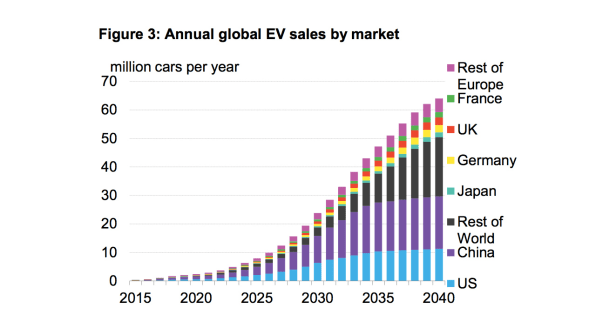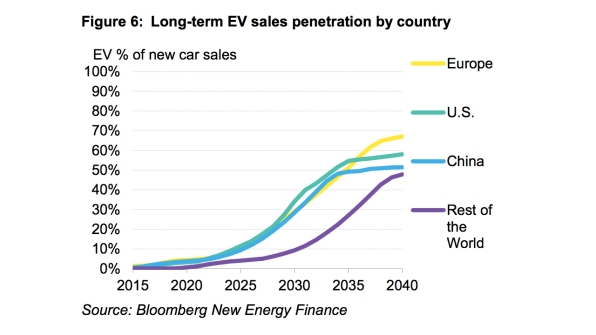Electric cars haven’t exactly been flying out of showrooms in the last few years. The Tesla phenomenon aside, EV sales currently make up less than 1% of the U.S. market. They remain relatively expensive compared to conventional vehicles (even after government subsidies) and hampered by the specter of “range anxiety” (the Nissan Leaf, the best-selling electric vehicle in the U.S., only goes about 100 miles on a single charge, though the vast majority of people don’t drive that much in a single day).

But, in the long run, this less-than-stellar start to the EV age may fade in the distance. Battery prices for EVs are falling fast, and several car manufacturers have announced plans to bet their futures on electric drivetrains. Volvo says every new model it releases starting in 2019 will be electric (though it will continue to make older gas-powered models for now). Volkswagen hopes to sell one million EVs a year by 2025 and to release 30 new EV models by 2030.
A new report from Bloomberg New Energy Finance gives further reason for optimism. It expects EVs to be as cheap as conventional cars in most places by 2025 and for EVs to make more than half of all new car sales by 2040 (54%). That’s a significantly more bullish forecast than it made last year, when it said that only about a third of new car sales would be electric by the same year. And it’s a good deal higher than official forecasts from the Energy Information Administration, which expects only about 1 million new EVs per year in the U.S. by 2040 (by comparison, new cars and truck sales numbered about 17.6 million last year).
BNEF is increasingly optimistic for one main reason: technology. It notes that, since 2010, prices for lithium-ion batteries have fallen 73% on a per-kilowatt basis, and that manufacturing advances and higher energy density will slash prices a further 70% or more by 2030.

“We see a momentous inflection point for the global auto industry in the second half of the 2020s,” says Colin McKerracher, BNEF’s lead advanced transport analyst. “Consumers will find that upfront selling prices for EVs are comparable or lower than those for average [internal combustion engine] vehicles in almost all big markets by 2029.”
Because cars are staying on the road for longer (the average is now more than 11 years), it’s going to take a while for EVs to actually take over. And the psychology of range anxiety could get in the way long after it’s no longer really an issue. Moreover, BNEF expects a lack charging infrastructure, particularly at home, to slow sales somewhat. But, having said that, EVs could be with us sooner than expected. In ten years, they may be the default choice for new sales, not a niche choice for relatively few.
By 2040, could half of all new cars be electric?
Electric cars haven’t exactly been flying out of showrooms in the last few years. The Tesla phenomenon aside, EV sales currently make up less than 1% of the U.S. market. They remain relatively expensive compared to conventional vehicles (even after government subsidies) and hampered by the specter of “range anxiety” (the Nissan Leaf, the best-selling electric vehicle in the U.S., only goes about 100 miles on a single charge, though the vast majority of people don’t drive that much in a single day).
Fast Company , Read Full Story
(23)